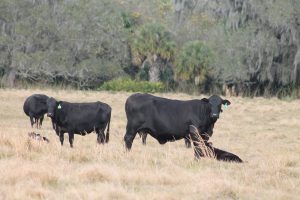The production of food and fiber is an extremely risky endeavor. Farmers and ranchers are at the mercy of the elements. Mark Twain said it best: “Farming is simply gambling with dirt”. Taking calculated risks and preventive measures can significantly impact what we do when feeding the world. Today we will be discussing an emerging issue that can affect livestock producers in Florida: Highly Pathogenic Avian Influenza (HPAI).
This emerging disease, also known as bird flu has been around the block since the early 1900s. Strains of bird flu have been observed for decades. The latest wave of this disease is known as HPAI, which primarily affects birds. Recent outbreaks have shown its ability to infect mammals, including dairy and beef cattle as well as goats.
Florida’s livestock and HPAI

Our state is a net exporter of live cattle. Our cow-calf operations produce the steers and heifers that feed stockyards in other states to supply the nation with beef products. Other livestock such as dairy cattle complete their life on the farm or near the one where they were born. Some operations that rely on feeding facilities where wild birds can be attracted by the easy access to food, and come in contact with livestock and, if infected, can inoculate (spread) virus such as H5NI. The potential risk of an outbreak in our state is low compared to poultry due to their different physiology and management practices.
Outbreaks in the poultry industry are more likely than in cattle operations. Florida has very few poultry operations. The commercial poultry operations in Florida rely on strict biosecurity procedures to prevent bird flu outbreaks from happening. The potential risk of outbreaks depends on backyard poultry flocks that come in contact with wild birds.
Regardless of the risk, be vigilant
There are signs to watch out for when it comes to infected animals with HPAI. While uncommon, HPAI infection in cattle can cause:
- Decreased milk production in dairy cattle
- Loss of appetite
- Respiratory distress
- Lethargy
- Sudden death
Some biosecurity measures for preventing HPAI
- Minimize Contact with Wild Birds: Limit access to ponds or areas frequented by wild birds.

Wild ducks can carry disease as well as other migrating birds that may opportunistically access feeding areas in our farm. Picture credit: Jonael Bosques, University of Florida. - Proper Disposal of Carcasses: Wear gloves and disinfect after handling dead birds.
- Restrict Movement of People and Equipment: Minimize unnecessary traffic around cattle pens.
- Rodent Control: Eliminate potential carriers that can introduce the virus.
- Biosecurity Training for Personnel: Educate staff on recognizing signs of HPAI and proper hygiene protocols.
There is a transmission risk to humans
The risk of HPAI transmission from infected cattle or birds to humans is considered low. However, it’s imperative to exercise caution when dealing with sick animals.

Avoid contact with sick animals. Don’t handle sick or dead birds or livestock. Wash hands thoroughly after contact with potentially infected animals or their environment. If you are harvesting poultry for your own consumption, ensure poultry reaches an internal temperature of 165°F (74°C) to kill any potential virus.
Regarding the safety of milk and meat from infected animals: proper milk pasteurization can eliminate viruses. The standard milk treatment process effectively kills viruses, including HPAI. Regarding poultry consumption, cook meat thoroughly (165°F) to eliminate the virus. Beef, pork and lamb should be cooked to an internal temperature of 145°F.
Contact us for more information!
Although this situation is still evolving, you can always contact UF/IFAS Extension Hardee County for further information on this or other agriculture-related topics. If you suspect your animals are infected with HPAI, please contact your veterinarian. For further assistance, please drop by our office located at 507 Civic Center Drive, Wauchula FL 33873 or call us at 863-773-2164.
Additional Resources:
- Highlights in the History of Avian Influenza (Bird Flu) Timeline (https://www.cdc.gov/flu/avianflu/timeline/avian-timeline-background.htm)
- Nation enters third year of historic HPAI epizootic (https://www.avma.org/resources-tools/animal-health-and-welfare/animal-health/avian-influenza)
 0
0
